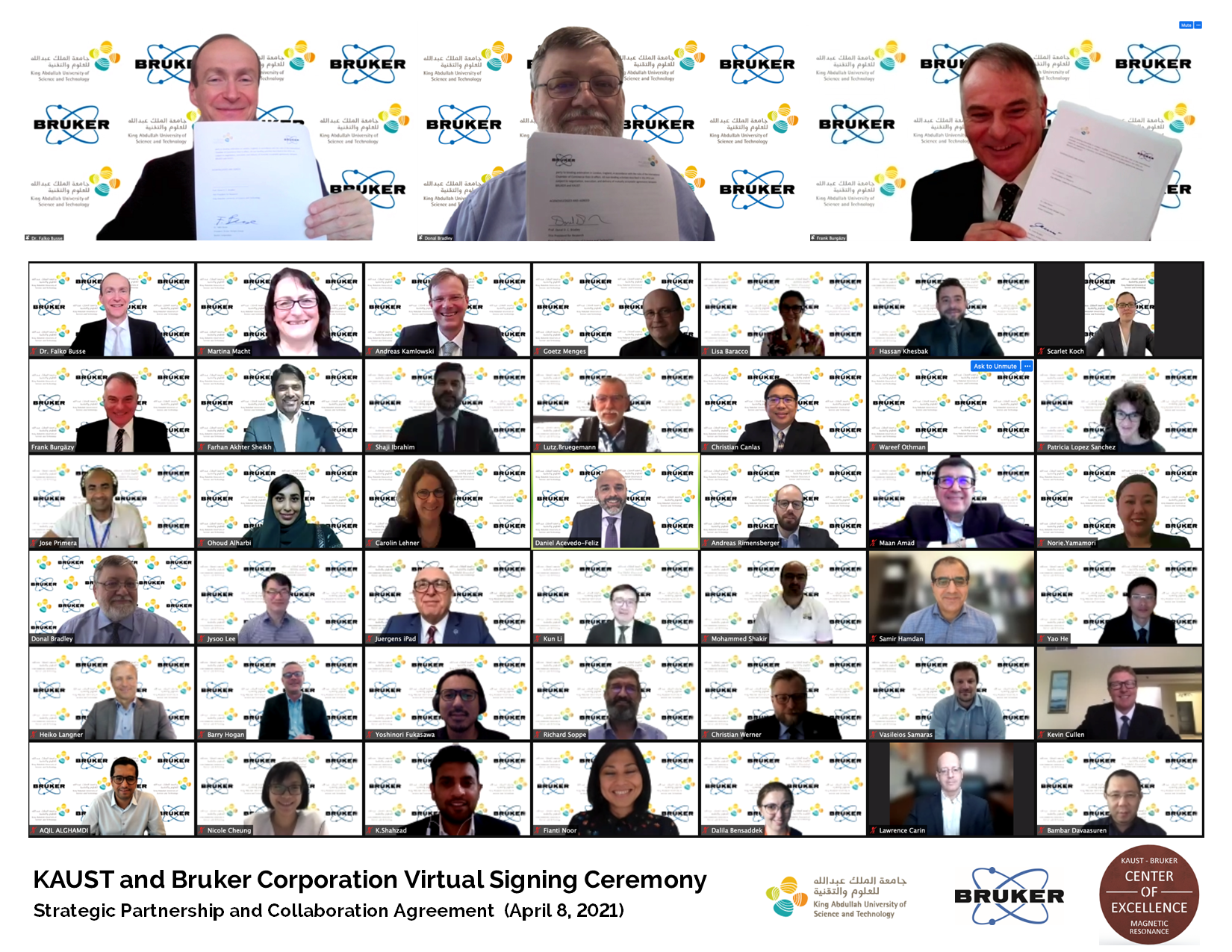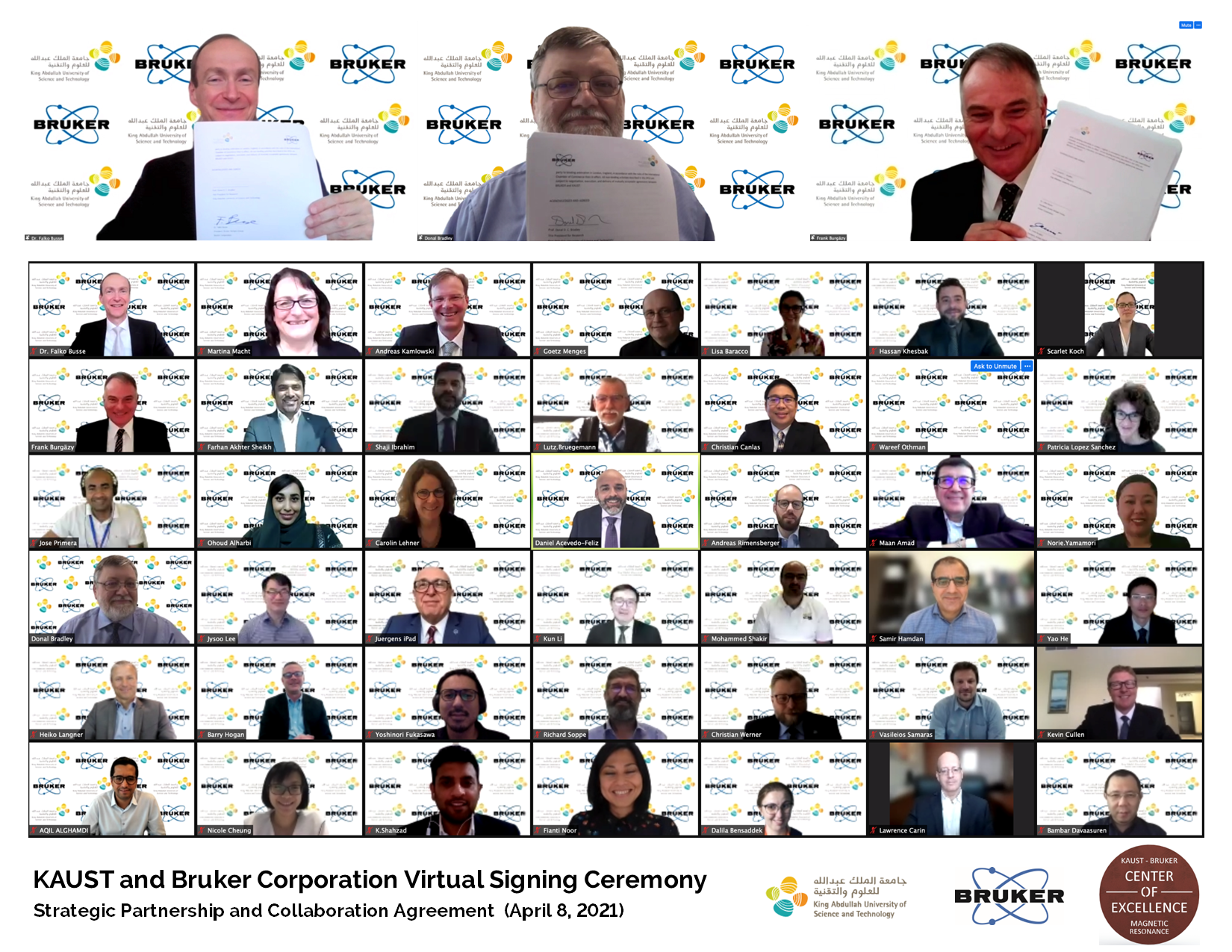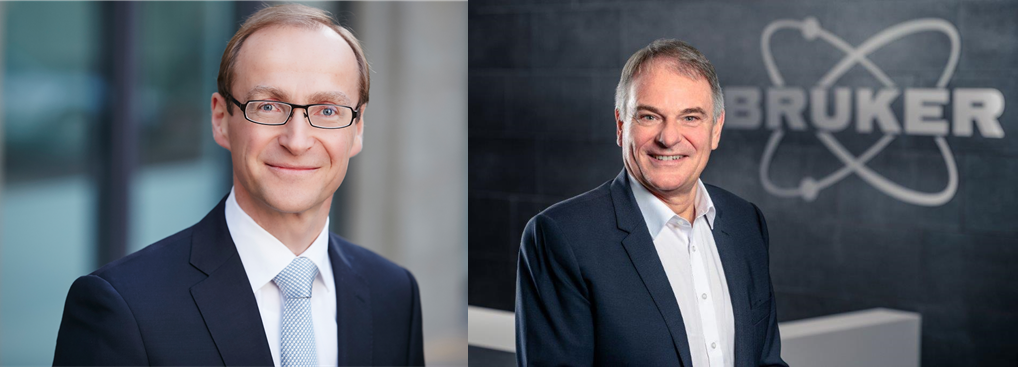KAUST advances strategic partnership with Bruker


Representatives from KAUST and the Bruker Corporation, including senior leadership, attend a virtual signing ceremony on April 8 to renew the two organizations’ Memorandum of Understanding and expand it into a Strategic Partnership and Collaboration Agreement. File photo.
KAUST and Bruker have a longstanding and mutually beneficial relationship that began more than a decade ago. A 2018 milestone for the two organizations was the signing of an MoU to launch the KAUST-Bruker Center of Excellence (CoE) for Magnetic Resonance (MR) located in the University's Core Laboratories.
The CoE allows KAUST to uphold its reputation as an internationally renowned research institution providing scientific expertise to Saudi Arabia, the region and the wider world. In the CoE, KAUST researchers and partners work with instruments at the frontline of innovation; are trained in the most advanced technologies; and collaborate with a world-class technology innovator to develop pioneering tools that solve specific challenging scientific and engineering problems.
"The CoE helps KAUST keep the nuclear magnetic resonance (NMR) facility at the cutting edge to meet the needs of the University's researchers and enhance its expertise in the niche research areas of electron paramagnetic resonance and dynamic nuclear polarization," said Dr. Kun Li, acting facilities director, KAUST Materials Characterization, Nanofabrication and Plant Growth Core Labs . "Furthermore, access to Bruker's technology roadmaps and technology forums places KAUST in an advantage position to plan ahead its technology portfolio and align it with its future research needs."
A growing partnership
Under this new agreement, KAUST and Bruker expand the CoE to include X-ray technologies, signifying a heightened technological interaction between the two organizations.
"X-ray diffraction (XRD) is a very powerful technique which has been widely used to study the structure of materials," stated Dr. Daniel Acevedo-Feliz, interim executive director, KAUST Core Labs and Research Infrastructure. "The partnership between the two parties has helped transform the University's XRD lab from a routine lab into a state-of-the-art facility, allowing the development of most advanced capabilities in the field in-house. We are also looking at expanding the partnership to other X-ray technologies in the future."
"The extension of the established CoE to include X-ray characterization technologies is an exciting step to further deepen the collaboration between KAUST and Bruker," stated Dr. Frank Burgaezy, president of Bruker AXS. "Bruker's state-of-the-art X-ray technology is enabling the KAUST community of world-class researchers to further strengthen their development of sustainable solutions addressing the demands to counter global challenges."
Bruker tech, KAUST expertise
The KAUST and Bruker partnership continues to grow in other technological areas, including mass spectrometry and advanced scanning probe microscopy. In February 2021, Bruker also established a Bruker Arabia office at the University's Research and Technology Park, strengthening the level of Bruker customer support for the KAUST and wider research community.

Dr. Falko Busse (left), president of Bruker Biospin, and Dr. Frank Burgaezy (right), president of Bruker AXS, support the deepening of the collaboration between KAUST and Bruker. Images courtesy of the Bruker Corporation.
.jpeg)
KAUST Vice President for Research Donal Bradley. File photo.
"Since the signing of the MoU in 2018, the professional trust and collaborative efforts between KAUST and Bruker have grown significantly in all aspects of the technology and service support required by our users," said Prof. Donal Bradley, KAUST vice president for research. "The renewed agreement has a solid foundation to move forward on all fronts—and in particular in the area of national and regional outreach activities. We hope to further enhance our workshops and training offerings, joining together Bruker's technology and KAUST's expertise to help accelerate the growth of world-class researchers in the Kingdom."
Related stories:
- KAUST-Bruker CoE in Magnetic Resonance Inaugurated
- KAUST and NEOM establish Center of Excellence
-
KAUST and King Abdulaziz University join forces to support research in cancer, renewable energy and desert agriculture

